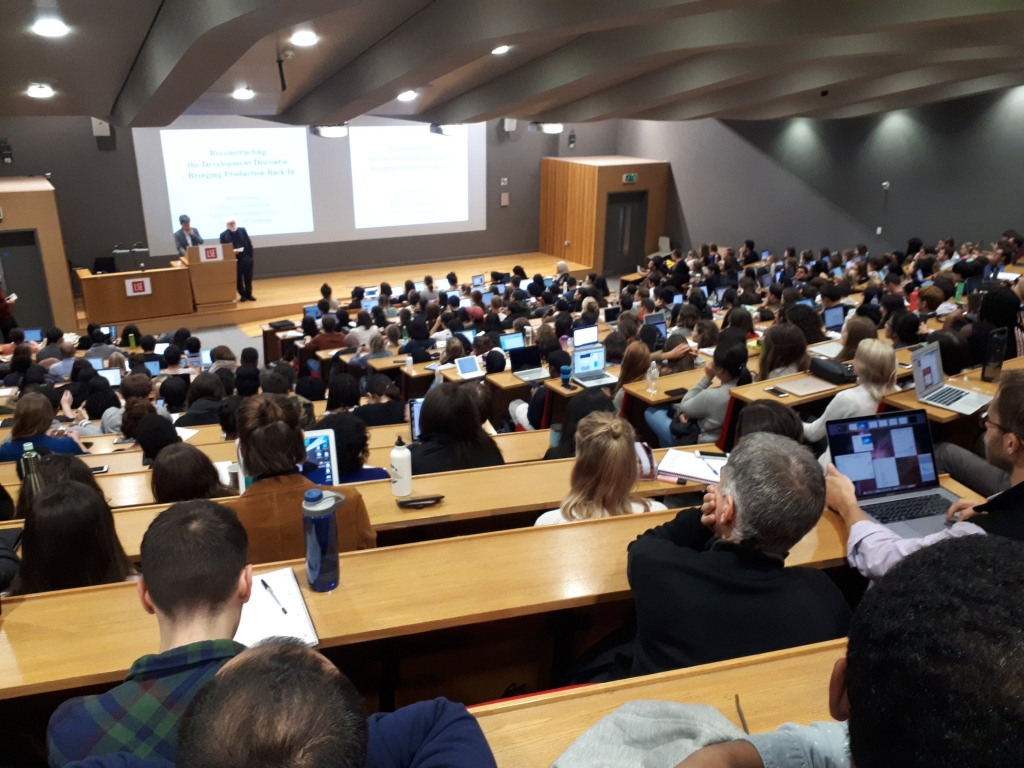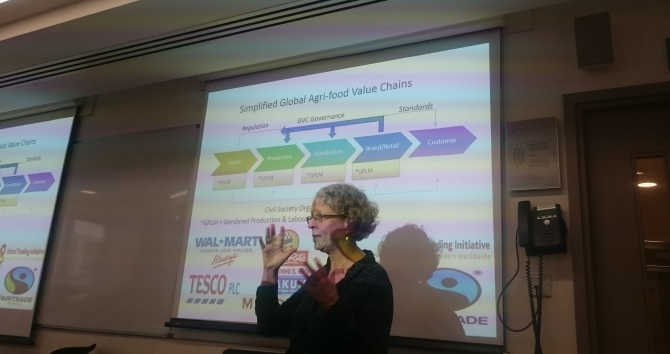MSc Development Studies student, Huiyi Chen, covered the recent guest lecture from Development Economist, Ha-Joon Chang, as part of our weekly International Development Department’s Cutting Edge Issues in Development Thinking and Practice lecture series. Huiyi gives her reflections on the lecture and tells us what she took away from the event.
This is the second of two blog posts from our students for Ha-Joon Chang’s lecture. Earlier today we published, MSc International Development and Humanitarian Emergencies student, Nicole Oloo’s, reflection on the talk.
Going back to two years ago, I was a second-year student struggling with putting up the building blocks of knowledge and consistently doubting many things that I’ve been learning about the world we are in: the institutional designs, the global political economy hierarchy, the “regime” of neoliberalism that has been dictating policy-making in most countries etc. Until I came crossed a chapter in the book Kicking Away the Ladders by Dr Ha-Joon Chang, I was more aware than ever that the world was not the same as what the seemingly smartest brains purposively depicted to us. I am always grateful for his intellectual contribution that told me there are actually ways to prove that the existing system and development mentalities could be intrinsically flawed. Fortunate enough, I attended a lecture given by Dr Chang, who was invited to our “Cutting-Edge Issues in Development Thinking and Practice” lecture series. Like many of his writings, on the lecture, he challenged perpetuating fallacies in conventional wisdoms that people often buy into, and proposed alternative.
Dr Chang addressed a relatively old-school definition of economic development widely acknowledge in the 1970s – the transformation of the abilities to produce, or productive capabilities. The debates about what development entails have yet been settled, but there are several influential streams of arguments from the neoliberalists, humanists and post-industrialists. Though as powerful as they all seem, production has been absent from the considerations. With productive capabilities missing from the planning, the poor countries continue to struggle in the poverty trap.
Neo-legalists, humanists, post-industrialists…Thank you, but no, thanks.
Myth 1: Public Policy intervention *eyes rolled up*? Trust free market – and individual capabilities
Deregulation and the free market might be the two flagship ideas of neo-liberalism that phenomenally swept through the world since the 1980s. However, historically it has been proved “toxic” to many developing countries: during the high years of neo-liberalism, the GDP per capita growth rate has been close to zero or even negative in Latin America and Africa. In contrast, the developed countries made a decent performance of 2.1% during the same period. Thus different countries shall have different scopes of the economy and a pre-settled model of neoliberalism was not the master key.
Another alternative definition of development shifts the emphasis on production to the improvements in “humanist” perspectives, believing that individuals could be made more capable through improvements in aspects like health and education. Dr Chang contended that the capabilities that could be developed through improvements on the individual level are limited. Instead of individuals, productive enterprises are the main component that generates productive capabilities (which is also why microfinance fail to target at the root of the issue). What’s more, the over individualist views ignored the role of collective institutions, which a country need to equipped with to effectively coordinate the cooperation among various economic actors.
Myth 2: Farewell Manufacturing, it’s Now the Era for Service
The post-industrialist discourse claimed that the rising income has made the shift of demand towards service, therefore if you want future prosperity, the focus of economy should be a tilt towards the service sector. For many years, this post-industrialist agenda was labelled with even more fanciful words like “structural upgrading” in policy white-papers, news, governments reports, research articles, public talks etc. It seemed that the service sector was inherently superior.
Dr Chang pointed out that the post-industrialist discourse is based on the assumption that even for the poorest country, the capability to compete in service is what they naturally possess. What the service-prospered miracles like Switzerland and Singapore have other hidden strategies (they are actually among the most industrialized economies in the world). In fact, the “so-called” high-value services like finance and retail could not be sustained without manufacturing as a solid foundation, even many of the service sectors like finance were established to further facilitate the manufacturing development.
Next, how do we take in ladders?
The most important reconsideration on the approach to development is bringing the productive capacities back onto the table, fundamentally because individuals not only bears the identity as consumers (from the neoliberal school) or citizens (from the humanist perspective) but also producers. Our employment and work matter to every aspect of our own daily life as well as the capacity for the society as a whole to generate comprehensive progress. Neglecting productive capabilities not only have exaggerated some development fairy tales, but also has made many developing countries complacent about their dependence on commodities and cheap assembly, and refuse to move forward to try out other economic activities in the long run.
By challenging those ongoing myths, we need to keep in mind that while navigating the world and different development discourses, the golden rule is to THINK CRITICALLY, especially about the real story behind. What we see may only be what wanted to be seen. Rather than fetishizing a fixed package, thinking it could automatically unlock the gateway to development. We should instead celebrate the diversity in development paths. Collective improvements do not necessarily collide with individual wellbeing, and the boom in manufacturing does not necessarily draining the resources to have a strong service sector. We should be aware of the “taken-for-granted” assumptions, and also remember not boxes our choices and scope to a narrow range of policy recommendations of any forms or any schools.
I would take the ideas from Dr Chang as a general framework instead of a step-by-step instruction, because even with “production”, it is not simply about the material output or the technological advancements. Dr Chang summarized that the talk on production is not limited to technological advancements, but also more social components like institutions, culture, organizations and even politics that supplement each other to pave the way that carries forward the development agenda.
The old ladders were kicked away, but why not produce the new ones, customizable for individual countries?
Don’t forget to join us this Friday for our second Cutting Edge Issues in Development Thinking and Practice lecture with guest speaker Mariz Tadros who will give a talk on “Resistance, revolt and gender justice in Egypt: contending narratives of pathways of change”. Friday 18 October, 4-6pm in the Sheikh Zayed Theatre. External guests please register via: https://bit.ly/2kvbH69.
Huyi Chen is a MSc Development Studies student at the LSE. She graduated from University of Toronto, Canada with BA in International Relations, Political Science and Contemporary Asian Studies. Her primary areas of interests includes informal economy, China’s BRI project and the comparative political economy of development in post-revolutionary societies.
The views expressed in this post are those of the author and in no way reflect those of the International Development LSE blog or the London School of Economics and Political Science.






